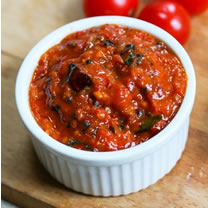
When looking for the French word for chutney last night we discovered the word aigre (sour), and realised that vinegar, or vinaigre in French, must be wine (vin) that is sour (aigre). This is indeed the origin of vinegar and vinaigre.
Vin (wine) comes from the Latin vīnum (wine, grapes, grapevine), from Proto-Italic *wīnom (wine), from Proto-Indo-European *wóyh₁nom (wine).
Aigre (sour, sharp, acid, shrill) comes from the Old French, from Vulgar Latin *acrus / *acrum, from the Classical Latin acer / acrem (sharp, sour, bitter), from Proto-Italic *akris (sharp, sour), from Proto-Indo-European *h₂ḱrós (sharp).
Chutney is a sauce made from fruit and/or vegetables preserved with vinegar and sugar. The word comes from the Hindi चटनी (catnī / chatnee – to lick). In French it is chutney, épice or salade piquante, and is defined as “condiment aigre-doux” (bittersweet condiment), which is where I found the word aigre.
Your last translation is interesting for showing how language channels our thoughts. Because ‘aigre-doux’ is, of course, ‘sour-sweet’, not ‘bittersweet’, but the term ‘bittersweet’ is very common in English, while I don’t think I’ve ever come across the term ‘sour-sweet’. The closest I’ve seen is ‘sweet and sour (sauce)’, and that has a very strong implication of Chinese food for me, to the point where describing chutney as ‘sweet and sour’ would confuse the listener.
@Jonathan:
Very interesting. Bittersweet as an adjective is actually « doux-amer » in French, and the plant is feminine « douce-amère ».
https://en.wiktionary.org/wiki/doux-amer
https://en.wiktionary.org/wiki/bittersweet
https://fr.wikipedia.org/wiki/Douce-am%C3%A8re
Sounds like “aigre-doux” means “sweet and sour” more than “bittersweet”. That would also be in line with Spanish “agridulce” and Italian “agridolce”.
There is the archaic word alegar, presumably from ale + aigre, referring to vinegar made from ale.
The PIE stem ak (‘be sharp’, ‘rise to a point’) also gives us acrid, acid, acute (hence also cute), ague, eager, edge, axe and acrimony.
(Thanks to https://www.etymonline.com and https://en.wiktionary.org )